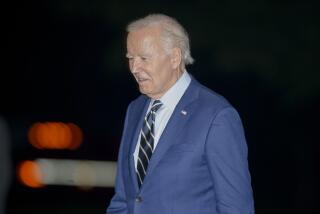With Trump in the White House, Israel moves aggressively to build on disputed land
Reporting from Tel Aviv — The city of Jerusalem, emboldened by anticipated support from the Trump administration, on Sunday authorized the construction of some 560 new homes in areas of the city claimed by the Palestinians as a capital of their future state.
The announcement came as members of Israel’s right-wing government clamored for Israeli expansion in the West Bank and in East Jerusalem, and Prime Minister Benjamin Netanyahu held what was described as a “very warm” phone conversation with President Trump.
“A new era has begun,” Education Minister Naftali Bennett, the leader of the pro-settlement Jewish Home party, told Israeli reporters, calling on government ministers to support a decision to extend Israeli sovereignty to the West Bank.
Such moves would likely prompt Palestinian and international accusations about Israel torpedoing prospects to create a Palestinian state in the West Bank and Gaza, and pose a test of the fledgling Trump administration’s policy on the peace process.
For the last eight years, the Obama administration has consistently called out Israel on settlement activity and pressured Israel into a building freeze. Settlements were a source of bitterness in relations between the governments.
Trump has consistently promised warmer relations with Israel, and his nominee as ambassador, David Friedman, is a patron of one of the Israeli settlements in the West Bank, suggesting a reversal of longstanding U.S. policy. Moreover, Trump has promised to move the U.S. Embassy in Israel from Tel Aviv to Jerusalem, marking a break with decades of U.S. policy that the status of Jerusalem should be determined in peace talks.
Members of Netanyahu’s coalition are pushing for a parliamentary bill to annex Maale Adumim, a sprawling settlement east of Jerusalem with a population of tens of thousands. Annexing it would nearly sever the West Bank between north and south.
“There is a giant change in the policy of the U.S., and we have to take that change into account — for our own benefit,” said Ofir Akunis, a lawmaker from Netanyahu’s Likud party, who said he would support annexation.
The political pressure has left Netanyahu in the awkward position of the party pooper. As if to tamp down calls for immediate moves on the settlements hours before his phone conversation with Trump on Sunday, Netanyahu told cabinet ministers that discussing a joint policy with the U.S. on Iran is currently his top priority.
The prime minister’s office released a statement after the phone call calling it “very warm,” and saying that Netanyahu “expressed his desire to work closely with President Trump to forge a common vision to advance peace and security in the region, with no daylight between the United States and Israel.”
The statement added that the two leaders discussed the nuclear deal with Iran, the peace process with the Palestinians and other issues. Trump invited Netanyahu to meet in Washington in February.
The White House issued a statement that also mentioned the Iran discussion and the invitation to Netanyahu. It added that Trump “affirmed his unprecedented commitment to Israel’s security and stressed that countering ISIL and other radical Islamic terrorist groups will be a priority for his administration,” using an acronym for Islamic State.
The statement continued: “The president emphasized that peace between Israel and the Palestinians can only be negotiated directly between the two parties, and that the United States will work closely with Israel to make progress towards that goal.”
The Jerusalem planning board decision dealt with building approvals for houses in the neighborhoods of Ramat Shlomo, Ramot and Pisgat Zeev, all of which are located in northern areas of the city captured by Israel during the 1967 Six Day War. Most of the international community considers the neighborhoods to be settlements that violate international law. In December, the U.N. Security Council condemned building activity there as illegal and an impediment to a peace deal.
The Palestinian Authority condemned the building announcement and called on the Security Council for “urgent action.” Nabil Abu Rudeineh, a spokesman for President Mahmoud Abbas, said that it reflects the “extremist policy of the Israeli government which is destroying the two state solution.”
Jerusalem Deputy Mayor Meir Turjeman wrote on his Facebook page that that the new building approved on Sunday was timed to herald the change in administration and that it was “just the starting gun.” In an interview with Israel Radio, Turjeman promised that after years of pressure from the Obama administration to limit building by Israel in East Jerusalem, the municipality would embark on a new path to build thousands of houses.
“Trump is the one who declared that after he is elected president that there would be no disputes with Israel on building in Jerusalem,” Turjeman said in the interview. “I’m simply implementing his philosophy.”
Mitnick is a special correspondent
ALSO
A terrorist attack in Germany could have hurt Angela Merkel politically. So far, it hasn’t
It’s a bird! It’s a plane! Therein lies the problem at Lebanon’s international airport
Attempt by Israel to bulldoze homes in Bedouin village leads to violence, two deaths
More to Read
Sign up for Essential California
The most important California stories and recommendations in your inbox every morning.
You may occasionally receive promotional content from the Los Angeles Times.










